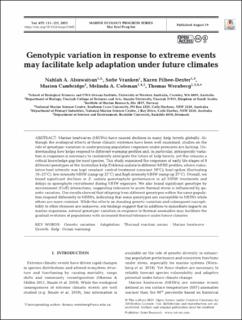| dc.description.abstract | Marine heatwaves (MHWs) have caused declines in many kelp forests globally. Although the ecological effects of these climatic extremes have been well examined, studies on the role of genotypic variation in underpinning population responses under pressures are lacking. Understanding how kelps respond to different warming profiles and, in particular, intraspecific variation in responses is necessary to confidently anticipate the future of kelp forests, yet this remains a critical knowledge gap for most species. This study examined the responses of early life stages of 9 different genotypes of the Australian kelp Ecklonia radiata to different MHW profiles, where cumulative heat intensity was kept constant: control treatment (constant 19°C), heat spikes (fluctuating 19-23°C), low intensity MHW (ramp up 23°C) and high intensity MHW (ramp up 27°C). Overall, we found significant declines in E. radiata gametophyte performance in all MHW treatments and delays in sporophyte recruitment during MHW exposure. We also found significant genotype by environment (G×E) interactions, suggesting tolerance to acute thermal stress is influenced by genetic variation. Our results showed that offspring from different genotypes within the same population respond differently to MHWs, indicating that some genotypes are susceptible to MHWs while others are more resistant. While the effects on standing genetic variation and subsequent susceptibility to other stressors are unknown, our findings suggest that in addition to immediate impacts on marine organisms, natural genotypic variation in response to thermal anomalies may facilitate the gradual evolution of populations with increased thermal tolerance under future climates. | en_US |
